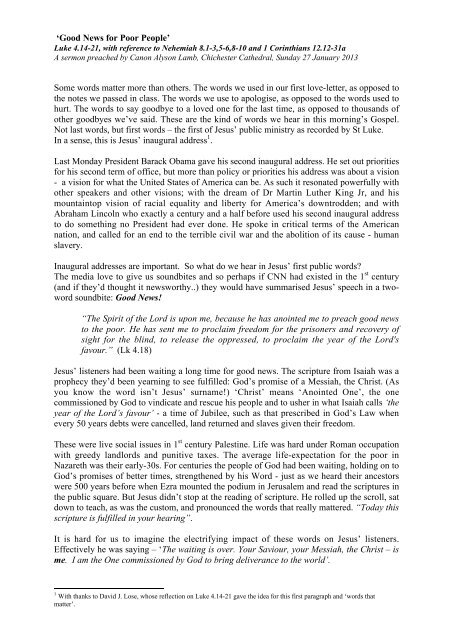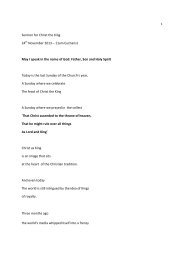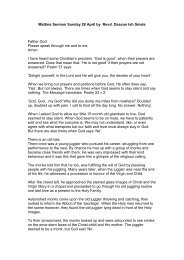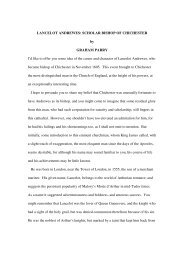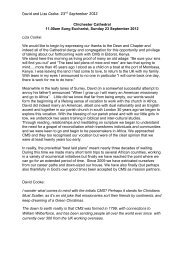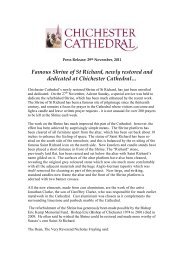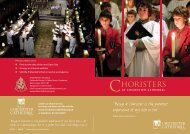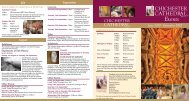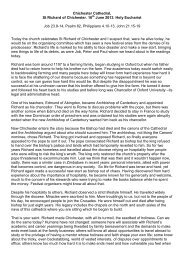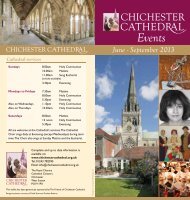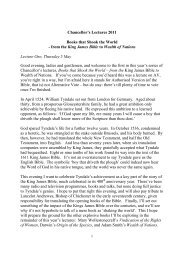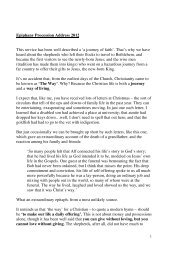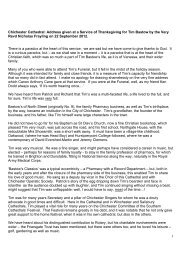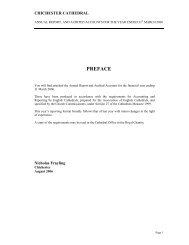The Reverend Canon Alyson Lamb, Prebendary of Wisborough
The Reverend Canon Alyson Lamb, Prebendary of Wisborough
The Reverend Canon Alyson Lamb, Prebendary of Wisborough
You also want an ePaper? Increase the reach of your titles
YUMPU automatically turns print PDFs into web optimized ePapers that Google loves.
‘Good News for Poor People’<br />
Luke 4.14-21, with reference to Nehemiah 8.1-3,5-6,8-10 and 1 Corinthians 12.12-31a<br />
A sermon preached by <strong>Canon</strong> <strong>Alyson</strong> <strong>Lamb</strong>, Chichester Cathedral, Sunday 27 January 2013<br />
Some words matter more than others. <strong>The</strong> words we used in our first love-letter, as opposed to<br />
the notes we passed in class. <strong>The</strong> words we use to apologise, as opposed to the words used to<br />
hurt. <strong>The</strong> words to say goodbye to a loved one for the last time, as opposed to thousands <strong>of</strong><br />
other goodbyes we’ve said. <strong>The</strong>se are the kind <strong>of</strong> words we hear in this morning’s Gospel.<br />
Not last words, but first words – the first <strong>of</strong> Jesus’ public ministry as recorded by St Luke.<br />
In a sense, this is Jesus’ inaugural address 1 .<br />
Last Monday President Barack Obama gave his second inaugural address. He set out priorities<br />
for his second term <strong>of</strong> <strong>of</strong>fice, but more than policy or priorities his address was about a vision<br />
- a vision for what the United States <strong>of</strong> America can be. As such it resonated powerfully with<br />
other speakers and other visions; with the dream <strong>of</strong> Dr Martin Luther King Jr, and his<br />
mountaintop vision <strong>of</strong> racial equality and liberty for America’s downtrodden; and with<br />
Abraham Lincoln who exactly a century and a half before used his second inaugural address<br />
to do something no President had ever done. He spoke in critical terms <strong>of</strong> the American<br />
nation, and called for an end to the terrible civil war and the abolition <strong>of</strong> its cause - human<br />
slavery.<br />
Inaugural addresses are important. So what do we hear in Jesus’ first public words?<br />
<strong>The</strong> media love to give us soundbites and so perhaps if CNN had existed in the 1 st century<br />
(and if they’d thought it newsworthy..) they would have summarised Jesus’ speech in a twoword<br />
soundbite: Good News!<br />
“<strong>The</strong> Spirit <strong>of</strong> the Lord is upon me, because he has anointed me to preach good news<br />
to the poor. He has sent me to proclaim freedom for the prisoners and recovery <strong>of</strong><br />
sight for the blind, to release the oppressed, to proclaim the year <strong>of</strong> the Lord's<br />
favour.” (Lk 4.18)<br />
Jesus’ listeners had been waiting a long time for good news. <strong>The</strong> scripture from Isaiah was a<br />
prophecy they’d been yearning to see fulfilled: God’s promise <strong>of</strong> a Messiah, the Christ. (As<br />
you know the word isn’t Jesus’ surname!) ‘Christ’ means ‘Anointed One’, the one<br />
commissioned by God to vindicate and rescue his people and to usher in what Isaiah calls ‘the<br />
year <strong>of</strong> the Lord’s favour’ - a time <strong>of</strong> Jubilee, such as that prescribed in God’s Law when<br />
every 50 years debts were cancelled, land returned and slaves given their freedom.<br />
<strong>The</strong>se were live social issues in 1 st century Palestine. Life was hard under Roman occupation<br />
with greedy landlords and punitive taxes. <strong>The</strong> average life-expectation for the poor in<br />
Nazareth was their early-30s. For centuries the people <strong>of</strong> God had been waiting, holding on to<br />
God’s promises <strong>of</strong> better times, strengthened by his Word - just as we heard their ancestors<br />
were 500 years before when Ezra mounted the podium in Jerusalem and read the scriptures in<br />
the public square. But Jesus didn’t stop at the reading <strong>of</strong> scripture. He rolled up the scroll, sat<br />
down to teach, as was the custom, and pronounced the words that really mattered. “Today this<br />
scripture is fulfilled in your hearing”.<br />
It is hard for us to imagine the electrifying impact <strong>of</strong> these words on Jesus’ listeners.<br />
Effectively he was saying – ‘<strong>The</strong> waiting is over. Your Saviour, your Messiah, the Christ – is<br />
me. I am the One commissioned by God to bring deliverance to the world’.<br />
1 With thanks to David J. Lose, whose reflection on Luke 4.14-21 gave the idea for this first paragraph and ‘words that<br />
matter’.
If words like this came from the mouth <strong>of</strong> any president or a prime minister at best we’d think<br />
it unrealistic - more likely arrogant, self-deluded hubris. But as we know, Jesus delivered on<br />
his claim. On one hand he delivered socially, materially: he fed hungry multitudes, he healed<br />
sick people, he raised the dead, he cared for the poor and marginalised and he commanded his<br />
disciples to do the same. But Jesus’ concern was not just for our earthly, material condition;<br />
he was concerned for our eternal, spiritual selves. When he speaks here <strong>of</strong> “freedom” the<br />
word he uses is the same he uses elswhere in Luke’s gospel to mean ‘forgiveness’ – and we<br />
all need that. <strong>The</strong> world needs that.<br />
<strong>The</strong>re’s a limit to what governments can do - as illustrated in a story I heard over Christmas,<br />
about a note written to Santa:<br />
Dear Santa there are 3 little boys who live in our house. Jeffery he’s 2, David he’s 4 and<br />
Norman he’s 7. Jeffery is good some <strong>of</strong> the time, David is good some <strong>of</strong> the time, Norman is<br />
good all <strong>of</strong> the time. I am Norman.<br />
<strong>The</strong> truth is that none <strong>of</strong> us is Norman. None <strong>of</strong> us is good all <strong>of</strong> the time. We all need<br />
forgiveness, we need to be set free from the penalty <strong>of</strong> the things that try as we might we can’t<br />
help doing and thinking, the things that cause us and other people to suffer and that spoil our<br />
world. We can’t free ourselves, only God can, and that’s why God came – and all out <strong>of</strong> his<br />
love for us.<br />
We know that it was love, because <strong>of</strong> the Cross. It was at the cross that the Maker <strong>of</strong> heaven<br />
and earth, the God <strong>of</strong> a billion galaxies, spread out his arms and said ‘This is how much I love<br />
you’. And as they drove in the nails, on one hand he took every sin and evil that has ever<br />
been committed, and on the other he took every sin and wrong that’s ever going to be<br />
committed, and as he hung there Jesus cried out “It is finished”. He died for you and he died<br />
for me, for the way into God’s presence to be made clear and open, so that we could be<br />
forgiven and have a fresh start. And it’s at the cross, deep down in our innermost being, that<br />
we hear the whisper ‘My son, my daugher, I love you, you are forgiven, you are free.<br />
And three days later, when God did the unimaginable and raised Jesus from the grave to new<br />
life, he proved beyond doubt that Jesus was and is who he said he was: the Messiah, the<br />
Christ, the only one with the power to abolish our slavery to sin, and the power to defeat<br />
death, and the fear <strong>of</strong> death, and every fear that goes with it.<br />
Words matter, but actions speak louder than words and supremely it is at the cross and in the<br />
resurrection <strong>of</strong> Jesus that we see God in action; proving the depth <strong>of</strong> his love for us, proving<br />
his power to heal our lives and remake our broken world, proving that Jesus brings good<br />
news.<br />
And yet, if we listen closely to Jesus’ words we find there’s a paradox. This is not just<br />
‘general’ good news– it is good news for the poor. <strong>The</strong> paradox is that this is only good news<br />
for me and for you IF we are willing to admit the bad news in our lives - what is lacking,<br />
what is difficult and less than perfect, the places we find ourselves captive to habits or<br />
addictions or fears that we long to shed. This can be hard for us because there is so much<br />
pressure on us - externally, from our culture; and internally, from our own expectations <strong>of</strong><br />
ourselves – to be ‘fixed up’, not to need anything or anyone. But when we come to Jesus -<br />
whether we come for the first time or the ten-thousandth time - when we come to him and<br />
admit our poverty and need, then two things happen.<br />
First, we can receive the good news personally, for ourselves - forgiveness from failure,<br />
release from despair, a peace that passes understanding, assurance <strong>of</strong> God’s unconditional<br />
love.... and more. I’m sure that this has been the experience <strong>of</strong> many people here today. It<br />
was my own experience. I haven’t always been a vicar. In fact for most <strong>of</strong> my adult life I had<br />
no interest in Christianity; I thought it was untrue and unhelpful until by God’s grace I was
able to admit my need <strong>of</strong> his help, and my eyes were opened to the reality <strong>of</strong> Jesus and the<br />
truth that the Christian faith is not about rules it is about a relationship, a thrilling relationship<br />
with a living God who is knowable and interested in our lives, and who has a unique purpose<br />
for each one <strong>of</strong> us.<br />
Which brings us to the second thing:<br />
When we come to Jesus like this we realise that we don’t just receive the good news - God<br />
also equips us to be good news. This is what St Paul is speaking about in his letter to the<br />
Corinthian church. <strong>The</strong> daily miracle <strong>of</strong> the Christian faith is that every single time a person<br />
puts their trust in Jesus, God plants his own Spirit in them. <strong>The</strong> same Holy Spirit who<br />
anointed Jesus for his earthly ministry anoints us and gifts us – differently - in the ways we<br />
need for where God places us. It is in this way that together we become the Body <strong>of</strong> Christ,<br />
God’s hands and heart, carrying his good news to a world <strong>of</strong> need.<br />
Contrary to what I used to think, Christianity isn’t a lifestyle choice for a Sunday morning.<br />
We’re not designed to be some kind <strong>of</strong> religious social club, we’re called to be a transforming<br />
community - a community that enacts God’s vision <strong>of</strong> transformation for his world, socially,<br />
materially and spiritually.<br />
When Abraham Lincoln was complimented on his second inaugural address he replied:<br />
‘I believe it is not immediately popular. Men are not flattered by being shown that there has<br />
been a difference <strong>of</strong> purpose between the Almighty and them’.<br />
How should we respond to Jesus’ inaugural address?<br />
May I suggest a place to start? A question: What good news do you need, today?<br />
What are you struggling with? What wakes you in the middle <strong>of</strong> the night? What are your<br />
deepest longings, for your life, your family, your country - for our world?<br />
Some words do matter more than others. <strong>The</strong>y can be life-changing, world-electrifying. Are<br />
there words that you need to say to God, today?


